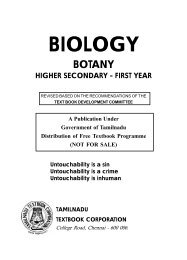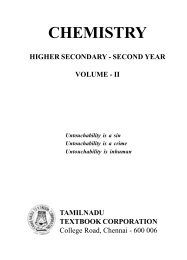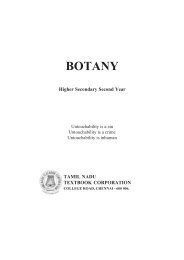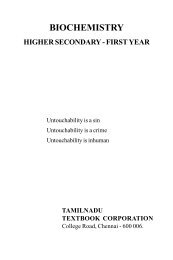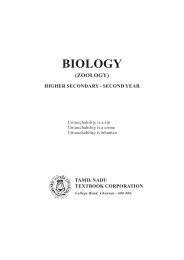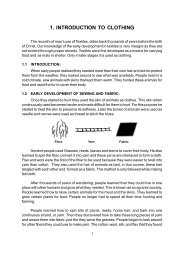higher secondary - first year - botany - Textbooks Online
higher secondary - first year - botany - Textbooks Online
higher secondary - first year - botany - Textbooks Online
You also want an ePaper? Increase the reach of your titles
YUMPU automatically turns print PDFs into web optimized ePapers that Google loves.
Beneficial Activities of Bacteria<br />
1. Sewage disposal : Organic matter of the sewage is decomposed by<br />
saprotrophic bacteria.<br />
2. Decomposition of plant and animal remains: Saprotrophic bacteria<br />
cause decay and decomposition of dead bodies of plants and animals. They<br />
release gases and salts to atmosphere and soil. Hence these bacteria are<br />
known as nature’s scavengers.<br />
3. Soil fertility :<br />
1. The ammonifying bacteria like Bacillus ramosus and B. mycoides convert<br />
complex proteins in the dead bodies of plants and animals into ammonia<br />
which is later converted into ammonium salts.<br />
2. The nitrifying bacteria such as Nitrobacter, Nitrosomonas convert<br />
ammonium salts into nitrites and nitrates.<br />
3. Nitrogen fixing bacteria such as Azotobacter and Clostridium and<br />
Rhizobium (a symbiotic bacterium) are capable of converting atmospheric<br />
nitrogen into organic nitrogen. All these activities of bacteria increase soil<br />
fertility.<br />
Recycling of matter<br />
Bacteria play a major role in cycling of elements like carbon, oxygen, Nitrogen<br />
and sulphur. Thus they help in maintaining environmental balance. As biological<br />
scavengers they oxidize the organic compounds and set free the locked up carbon<br />
as CO 2<br />
. The nitrogenous organic compounds are decomposed to form ammonia<br />
which is oxidized to nitrite and nitrate ions by the action of nitrifying bacteria.<br />
These ions are used by <strong>higher</strong> plants to synthesize nitrogenous organic compounds.<br />
The nitrogenous compounds are also oxidized to nitrogen by denitrifying bacteria.<br />
Role of Bacteria in Industry<br />
1. Dairy Industry<br />
Lactic acid bacteria e.g.(Streptococcus lactis) are employed to convert milk<br />
sugar lactose into lactic acid.<br />
C 12<br />
H 22<br />
O 11<br />
+H 2<br />
O 4C 3<br />
H 6<br />
O 3<br />
+Energy<br />
Lactose<br />
Lactic Acid<br />
Different strains of lactic acid bacteria are used to convert milk into curd,<br />
yoghurt(Lactobacillus bulgaricus) and cheese(Lactobacillus<br />
acidophobus).<br />
28




